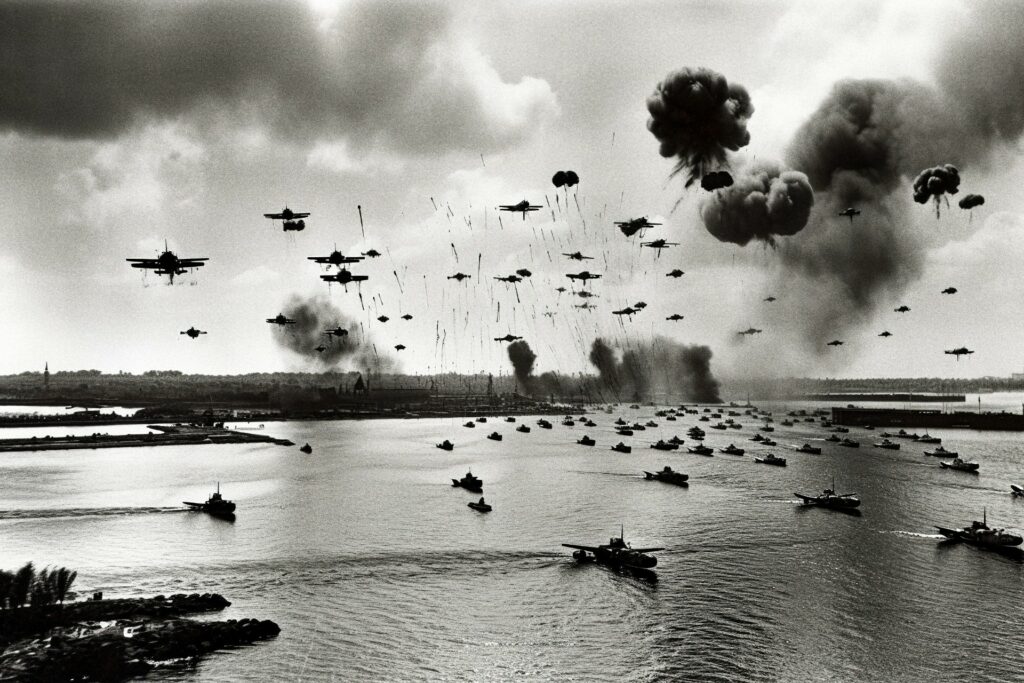December 7, 1941, a date immortalized by President Franklin D. Roosevelt as “a date which will live in infamy,” marks a pivotal moment in American history. On this day, the United States was thrust into the throes of World War II following the unexpected attack on Pearl Harbor by the Imperial Japanese Navy Air Service.
I had a client who was there that day as a musician stationed on the USS Arizona is the final resting place for over 900 of the ship’s 1,177 crewmen who lost their lives on December 7, 1941.
For anyone who has since visited Pearl Harbor, that is the shrine to those souls entombed there when it sank. My client left the ship to play in a church service that morning and was spared the fate of so many of his shipmates.
This event, devastating and shocking, catalyzed a response from what has come to be known as the Greatest Generation, a cohort of Americans who exhibited extraordinary resilience, unity, and bravery in the face of unprecedented challenges. I didn’t learn of his connection to the day that lives in infamy until his memorial service. Like so many of his time, he hesitated to share his involvement.
The mentality is summed up in “Flags of Our Fathers” by James Bradley, a story involving the Marines’ battle at Iwo Jima. The author’s father never discussed his role as a Flag raiser, as the heroes of Iwo Jima died there.
The moniker “Greatest Generation,” popularized by journalist Tom Brokaw, encompasses those who grew up during the Great Depression and then went on to fight in World War II, as well as those who contributed on the home front. Their response to the attack on Pearl Harbor epitomizes their exceptional character and steadfast spirit.
In the immediate aftermath of December 7, 1941, the United States witnessed a surge in national unity and patriotism. Young men and women from every corner of the country lined up to enlist in the armed forces. They were willing to leave their homes, families, and careers, driven by a sense of duty to protect their nation and the world from the spread of tyranny and oppression. This generation did not shy away from sacrifice; they embraced it with a sense of purpose and determination.
The bravery of the soldiers, sailors, airmen, and marines who fought in the Pacific and European theaters is legendary. They faced unimaginable horrors on battlefields far from home, yet their resolve never wavered. Stories of their courage, from the beaches of Normandy to the islands of the Pacific, have been etched into the annals of history, serving as a testament to their indomitable spirit.
Equally commendable were the efforts of those on the home front. Women, in unprecedented numbers, entered the workforce, taking up jobs in factories and shipyards. They became an integral part of the war effort, ensuring that the troops overseas were well-equipped and supplied. Rosie the Riveter, the cultural icon representing these women, became a symbol of female empowerment and resilience.
The home front also saw a united effort in rationing, recycling, and volunteering. Families grew victory gardens to supplement their food rations, children collected scrap metal, and communities organized war bond drives. Every individual, irrespective of age or occupation, contributed to the war effort in their own way, showcasing a remarkable spirit of collective responsibility and sacrifice.
The Greatest Generation’s response to the events of December 7, 1941, also laid the foundations for the post-war era. Their sacrifices and achievements not only led to victory in World War II but also ushered in a period of unprecedented economic growth and social change in the United States. They built the foundations of modern American society, characterized by a strong middle class, technological innovation, and a commitment to democracy and human rights.
In reflecting on the legacy of the Greatest Generation, it is crucial to acknowledge their resilience in the face of adversity, their unity in times of division, and their courage when confronted with danger. Their response to the attack on Pearl Harbor is a powerful reminder of the strength and character of the American spirit.
As we remember December 7, 1941, we pay homage to the Greatest Generation, so many of whom we have had the privilege or representing. They are a quickly disappearing national treasure.
Their story is one of triumph over adversity, a narrative that continues to inspire and guide future generations. It is a story of ordinary people who rose to meet extraordinary challenges and in doing so, defined the values of courage, sacrifice, and resilience that continue to shape our nation today.
In the end, the Greatest Generation did not just win a war; they transformed a nation. Their legacy is a beacon of hope, a reminder that even in our darkest hours, we have the capacity to overcome, to unite, and to prevail. Their response to the day that will live in infamy is a testament to the enduring strength of the human spirit; for that, they will always be remembered as the greatest among us.


